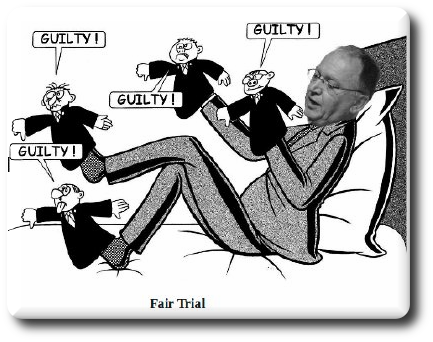

THE underlying issues at the European Patent Office (EPO) have not been addressed at all. They just rotated the face, swapping one Frenchman with another, António Campinos. In a 20-year period it's expected that almost 17 years will be French-led at the EPO. How ridiculous is that? A reader of ours calls it "La famiglia".
"It's almost as though Wingrove just writes whatever Bristows' main office tells him to write and the headline says "Constitutional Court ruling rumours spread" as if this "spread" somehow means there's truth to it; for all we can tell, the only ones "spreading" it are propaganda sites like the one Wingrove writes for."We are well aware that the Constitutional Court in Germany (FCC) is assessing the situation. It isn't helping that UPC propaganda sites (connected to the EPO and Team UPC) are perpetuating falsehoods. Patrick Wingrove is the latest to do this in a patent propaganda site which keeps spreading false rumours that are baseless and created out of thin air by Team UPC. It's really bad, but we suppose it says a lot about their journalistic standards. They have none; they just have sponsors and an agenda to sell. "Talk is building of a decision from the German Constitutional Court before year-end," Wingrove wrote, "the UK House of Lords heard evidence about Brexit’s effect, and the Italian Council of Ministers approved national legislation to adopt the Unitary Patent Regulation and the UPCA..."
What is the source for all this? Team UPC. It's almost as though Wingrove just writes whatever Bristows' main office tells him to write and the headline says "Constitutional Court ruling rumours spread" as if this "spread" somehow means there's truth to it; for all we can tell, the only ones "spreading" it are propaganda sites like the one Wingrove writes for. It's wishful thinking and lobbying; it's totally baseless and already refuted by the court.
There are many aspects to the complaint, presumably 4 main ones; one of the concerns is that UPC judges are controlled by (re)appointment policy, leaving them subservient to crooked circles like Battistelli's. It's not hard to see what Battistelli thinks of justice and judges. There's ample documentation of that. It's almost 2019 and the EPO Boards of Appeal still do not have independence; Campinos has changed nothing after corrupt Battistelli illegally attacked judges (the latest update is rather grim, claiming that Judge Corcoran was admitted into a psychiatric hospital).
Nobody wants to go through what Corcoran experienced, so nowadays the boards may seem spineless and subservient to those it rules on (the Office). Kluwer Patent Blog, which recently mentioned Corcoran's condition, said yesterday that a "EPO Board of Appeal decides plants can be patentable after all" (ridiculous) and to quote:
Those who thought that the battle on patenting of plants had gotten a final blow by the amendment of the European Patent Convention last year and the approach of the EPO examination following that (see this post), have not counted on the EPO Boards of Appeal.
The discussion on the patentability of plants has a long history within the EPO, which culminated in the amendment of Rules 27 and 28 EPC by the Administrative Council entering into force on 1 July 2017 (see this post). This amendment followed a Notice of the European Commission of 3 November 2016, indicating that the Biotech Directive 98/44 should have been interpreted as that plants obtained by essentially biological processes are not patentable.
Six organizations appealed today the European Patent Office’s September decision to uphold US pharmaceutical corporation Gilead Science’s patent on the key hepatitis C drug sofosbuvir. The appeal—filed by Médecins du Monde (MdM), Doctors Without Borders/Médecins Sans Frontières (MSF), AIDES (France), Access to Medicines Ireland, Praksis (Greece), and Salud por Derecho (Spain)—states that the European Patent Office (EPO) should revoke Gilead’s patent because it does not meet the requirements to be a patentable invention from a legal or scientific perspective.
The appeal comes exactly five years after sofosbuvir was first approved for use in the US, where Gilead launched the drug at $1,000 per pill, or $84,000 for a 12-week treatment course. The corporation has made more than $58 billion from sales of the drug and its combinations in the last five years.
Six organisations, including Médecins Sans Frontières (MSF, Doctors Without Borders), today appealed a European Patent Office decision to uphold Gilead Science’s patent on hepatitis C drug sofosbuvir.
In September, the European Patent Office (EPO) upheld Gilead’s patent on sofosbuvir in an amended form (IPW, Public Health, 13 September 2018).
MSF, along with Médecins du Monde (MdM), AIDES (France), Access to Medicines Ireland, Praksis (Greece) and Salud por Derecho (Spain), filed an appeal requesting that the EPO revoke Gilead’s patent. They argue it lacks the patentability requirement “from a legal or scientific perspective,” according to an MSF press release. The filed appeal document was not available at press time.
The Organisation for Economic Cooperation and Development (OECD) has released a new report that presents policy options for countries to strike a better balance between promoting financial incentives for pharmaceutical innovation and ensuring affordable access to medicines. Finding this balance, the report explains, will be essential for ensuring the sustainability of health systems.
epo.org link) that the EPO published yesterday. To quote:
The number of blockchain inventions is mushrooming, and the European Patent Office wants to ensure it handles the increasing patent applications consistently, officials said at a 4 December conference that brought together around 350 patent examiners and practitioners.